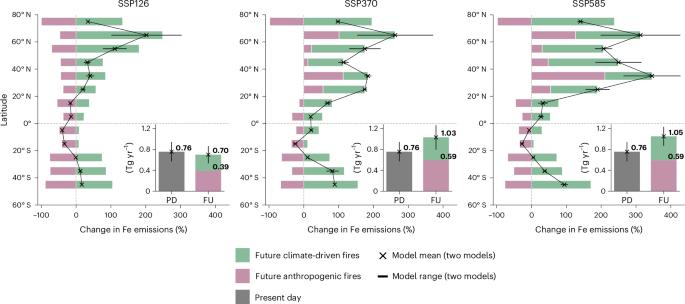未来气候导致的火灾可能会提高北大西洋铁资源有限的海洋生产力
IF 27.1
1区 地球科学
Q1 ENVIRONMENTAL SCIENCES
引用次数: 0
摘要
火情的快速变化通过释放碳和铁(Fe)等营养物质来影响碳循环,从而可能提高海洋生产力和碳出口。在这里,我们使用火排放预测和地球系统模型来研究气候驱动的火排放变化如何改变可溶性铁(SFe)沉积和生产力。到本世纪末,气候变化可能会使火灾产生的铁排放量增加1.7-1.8倍,超出仅考虑人类直接影响的预测。模式预测显示,随着社会经济活动的增加,北半球高纬度地区的SFe沉积会增加,在假定常量营养素水平稳定的情况下,可能会使SFe沉积对受铁限制的北大西洋生产力的影响每年增加20%(夏季增加40%)。然而,宏量营养素利用率的下降可能会缩小铁限制地区,在这些地区,气候驱动的火灾可以抵消7-8%的生产力损失。在南大洋,化石燃料排放主要控制SFe沉积,因为人为火灾的减少抵消了气候驱动的增加。本文章由计算机程序翻译,如有差异,请以英文原文为准。


Future climate-driven fires may boost ocean productivity in the iron-limited North Atlantic
Rapid shifts in fire regimes affect the carbon cycle by releasing carbon and nutrients such as iron (Fe), potentially enhancing marine productivity and carbon export. Here we use fire emission projections and Earth system models to examine how climate-driven changes in fire emissions may alter soluble Fe (SFe) deposition and productivity. By century’s end, climate change could increase Fe emissions from fires by 1.7–1.8 times beyond projections considering only direct human influences. Model projections show rising SFe deposition in Northern Hemisphere high latitudes under increasing socio-economic activity, potentially boosting the impact of SFe deposition on productivity in the Fe-limited North Atlantic by up to 20% annually (40% in summer), assuming stable macronutrient levels. However, declining macronutrient availability may shrink Fe-limited areas, where climate-driven fires could offset productivity losses by 7–8%. In the Southern Ocean, fossil fuel emissions primarily control SFe deposition, as reductions in anthropogenic fires counterbalance climate-driven increases. Fire emissions can be an important source of nutrients such as iron, particularly for the oceans. Here the authors estimate that climate-change-driven changes in fire emissions could increase iron deposition in ocean ecosystems, enhancing productivity particularly in the North Atlantic.
求助全文
通过发布文献求助,成功后即可免费获取论文全文。
去求助
来源期刊

Nature Climate Change
ENVIRONMENTAL SCIENCES-METEOROLOGY & ATMOSPHERIC SCIENCES
CiteScore
40.30
自引率
1.60%
发文量
267
审稿时长
4-8 weeks
期刊介绍:
Nature Climate Change is dedicated to addressing the scientific challenge of understanding Earth's changing climate and its societal implications. As a monthly journal, it publishes significant and cutting-edge research on the nature, causes, and impacts of global climate change, as well as its implications for the economy, policy, and the world at large.
The journal publishes original research spanning the natural and social sciences, synthesizing interdisciplinary research to provide a comprehensive understanding of climate change. It upholds the high standards set by all Nature-branded journals, ensuring top-tier original research through a fair and rigorous review process, broad readership access, high standards of copy editing and production, rapid publication, and independence from academic societies and other vested interests.
Nature Climate Change serves as a platform for discussion among experts, publishing opinion, analysis, and review articles. It also features Research Highlights to highlight important developments in the field and original reporting from renowned science journalists in the form of feature articles.
Topics covered in the journal include adaptation, atmospheric science, ecology, economics, energy, impacts and vulnerability, mitigation, oceanography, policy, sociology, and sustainability, among others.
 求助内容:
求助内容: 应助结果提醒方式:
应助结果提醒方式:


